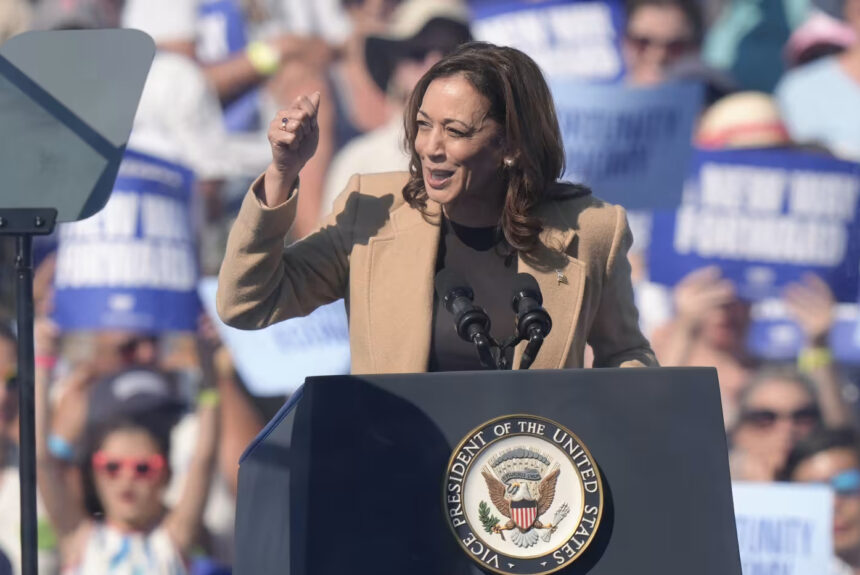The election is around the corner and, just like other elections before it, pocketbook issues are top of mind for voters. While annual inflation dropped to its lowest level since March 2021, prices are still 20.9% higher than they were in February 2020. At the same time, energy costs are expected to climb in the coming years as supply struggles to keep up with demand.
>>>READ: Harris Has a Policy Problem, not a Values Problem
Both presidential candidates have begun to put forth economic plans, including tax and trade policy. Donald Trump appears to be following the same game plan that he did in his first term—including a regrettable doubling down of higher tariffs that will harm American families and businesses alike. Kamala Harris, meanwhile, recently made headlines with her plan to increase taxes by $5 trillion over the next decade, the implementation of which would hurt consumers, investments in innovation, and energy and climate progress.
A Harris-Walz administration would support President Biden’s proposal to increase the corporate tax rate from 21 percent to 28 percent while implementing a 4 percent tax on stock buybacks. Harris has also signaled support for increasing the top marginal income tax rate to 39.6 percent (currently 37 percent) and upping Medicare surtaxes to 5 percent. Together these provisions would create a top marginal rate as high as 44.6 percent, according to The New York Times.
The Biden administration has also floated taxing long-term capital gains, which are assets held for more than one year, for Americans making $1 million or more per year at the same rate that it wants to tax high-income earners (39.6 percent). Vice President Harris has proposed a slightly pared-down rate of 33 percent. Currently, the highest rate is 20 percent. Harris would also introduce a minimum tax of 25 percent tax on unrealized capital gains—which are assets that haven’t been sold—and income for those with more than $100 million of wealth.
Harris will likely soon unveil a plan that would increase the existing tax deduction for small businesses and startups from $5,000 to $50,000.
While some have championed these proposals as a win for the working class, this tax plan is regressive and would hurt wage growth and investment in the United States.
Harris’s corporate federal tax rate hike and 44.6 percent top capital gains and dividend tax rate would “give the United States the highest total tax rate on corporate income in the developed world when combined with state taxes,” according to Dr. Adam Michel of the Cato Institute. While calls to increase taxes for corporations and the rich may be politically popular, it is worth noting that workers, not corporations, pay for these taxes. Some studies indicate that employees bear between 50 and 100 percent of the burden of the corporate income tax.
When factoring in the slower wage growth and decreased investment that these taxes produce, the true economic impact of a steep corporate tax rate becomes even higher. With less money in their pockets, consumers will be forced to spend less on necessities like food, health care, and energy while businesses will have fewer resources to invest in innovation.
>>>READ: Price Controls are a Threat to People and the Planet
Similarly, a higher tax rate on realized and unrealized capital gains will stifle investment and economic growth in the U.S. While Harris has said that these new rates will only apply to higher-income earners it establishes a dangerous precedent that could other tax brackets in the future. It is also the high-income individuals who have the means to invest in startups and small businesses. The complexity and accounting challenges of a tax on unrealized gains aside, these proposals will put American investors at a disadvantage—foreign entities and individuals won’t be subject to the tax—and pull money out from domestic markets.
Ultimately, American tax policy will be determined by the bills that Congress passes, not the president. However, with many of the provisions of the 2017 Tax Cuts and Jobs Acts expiring in 2025, the Harris tax proposal may reveal the progressive playbook should Democrats control Congress and the presidency.
Rather than implementing drastic tax increases, policymakers should embrace pro-growth, technology-neutral tax policies to spur innovation, increase spending power, and accelerate investment in the U.S. One example includes making immediate expensing—which allows a business to deduct a capital expense in the year that it occurred rather than over a depreciation scheduled–a permanent fixture of the tax code which would have demonstrable benefits to the economy and environment.
At the same time, lawmakers should avoid implementing policies like tariffs and targeted tax credits and subsidies for mature technologies—both of which stifle competition and allocate resources to politically preferred technologies rather than letting the market determine their value.
The Harris tax plan may sound like a progressive dream, but its regressive nature would be a nightmare for innovation, American competitiveness, and U.S. workers. Rather than implementing punitive tax increases, lawmakers should lower barriers to investment and energy production for the betterment of the economy and the environment.
The views and opinions expressed are those of the author’s and do not necessarily reflect the official policy or position of C3.
